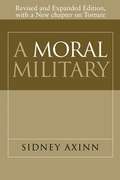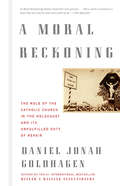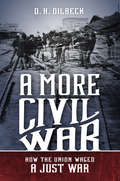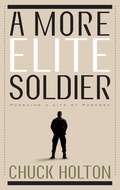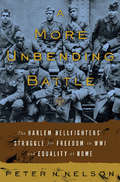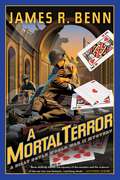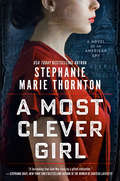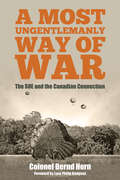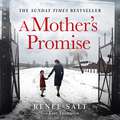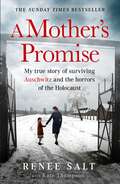- Table View
- List View
A Moral Military, Revised and Expanded Edition
by Sidney AxinnShould a good soldier ever disobey a direct military order? Are there restrictions on how we fight a war? What is meant by 'military honor', and does it really affect the contemporary soldier? Is human dignity possible under battlefield conditions? Sidney Axinn considers these basic ethical questions within the context of the laws of warfare and answers 'yes' to each of these questions. In this study of the conduct of war, he examines actions that are honorable or dishonorable and provides the first full-length treatment of the military conventions from a philosophical point of view. Axinn gives a philosophical analysis of the 'Laws of Warfare' as found in the Hague and Geneva Conventions, which have been agreed to by almost every nation in the world. The aims of his study are to establish a basic twentieth-century framework for moral military action and to assist military personnel in analyzing their won professional ethic.Stating that moral reasoning is required by people in military uniform in a wide variety of situations, the author examines the question of the limits of military obedience. Axinn argues for the seriousness of the concept of military honor but limits honorable military activity by a strict interpretation of the notion of war crime. Major chapters deal with military honor, prisoners of war, spying, war crimes, the dirty-hands theory of command, nuclear weapons, terrorism, and covert operations. This philosophical study of the line between honorable and dishonorable military action cautions that in compliance with the war conventions professional military personnel and knowledgeable civilians must not lose their moral nerve nor abandon honor to satisfy immoral political requests. Author note: Sidney Axinn is Professor of Philosophy at Temple University.
A Moral Reckoning: The Role of the Church in the Holocaust and Its Unfulfilled Duty of Repair
by Daniel Jonah GoldhagenWith his first book,Hitler's Willing Executioners, Daniel Jonah Goldhagen dramatically revised our understanding of the role ordinary Germans played in the Holocaust. Now he brings his formidable powers of research and argument to bear on the Catholic Church and its complicity in the destruction of European Jewry. What emerges is a work that goes far beyond the familiar inquiries--most of which focus solely on Pope Pius XII--to address an entire history of hatred and persecution that culminated, in some cases, in an active participation in mass-murder. More than a chronicle,A Moral Reckoningis also an assessment of culpability and a bold attempt at defining what actions the Church must take to repair the harm it did to Jews--and to repair itself. Impressive in its scholarship, rigorous in its ethical focus, the result is a book of lasting importance.
A More Civil War: How the Union Waged a Just War (Civil War America)
by D. H. DilbeckDuring the Civil War, Americans confronted profound moral problems about how to fight in the conflict. In this innovative book, D. H. Dilbeck reveals how the Union sought to wage a just war against the Confederacy. He shows that northerners fought according to a distinct "moral vision of war," an array of ideas about the nature of a truly just and humane military effort. Dilbeck tells how Union commanders crafted rules of conduct to ensure their soldiers defeated the Confederacy as swiftly as possible while also limiting the total destruction unleashed by the fighting. Dilbeck explores how Union soldiers abided by official just-war policies as they battled guerrillas, occupied cities, retaliated against enemy soldiers, and came into contact with Confederate civilians.In contrast to recent scholarship focused solely on the Civil War's carnage, Dilbeck details how the Union sought both to deal sternly with Confederates and to adhere to certain constraints. The Union's earnest effort to wage a just war ultimately helped give the Civil War its distinct character, a blend of immense destruction and remarkable restraint.
A More Elite Soldier: Pursuing a Life of Purpose
by Chuck HoltonThe rigor of becoming an Airborne Ranger is exceeded only by the challenge of being one - but those who join their ranks find fulfillment in something bigger than themselves. In the same way, pursuing God's objectives energizes our everyday lives. Former U. S. Army Ranger Chuck Holton shows how God oversees our training and gives each of us specific skills to accomplish the mission He has for us in this great spiritual war. Riveting action and powerful vignettes offer potent spiritual ammunition for the battles of every Christian serving in God's army. Find out what it takes to be a more elite soldier. Life is combat. From the instant the alarm clock signals the beginning of your day, you're jumping into a zone of uncertainty. Your survival depends on having a clear focus. YOUR OBJECTIVE: Get on mission as an elite soldier. Become part of something bigger than yourself. Your Commanding Officer will oversee your training, honing your skills to a razor-sharp edge. God will lead you through the danger zone of today's insecurity, equipping you to make a difference. In this riveting book, you will be issued potent spiritual ammunition for your daily battles from the perspective of a seasoned Special Operations soldier. UNCERTAINTY IS A GIVEN. FEAR IS OPTIONAL.
A More Unbending Battle: The Harlem Hellfighter's Struggle for Freedom in WWI and Equality at Home
by Peter NelsonThe night broke open in a storm of explosions and fire. The sound of shells whizzing overhead, screeching through the night like wounded pheasants, was terrifying. When the shells exploded prematurely overhead, a rain of shrapnel fell on the men below-better than when the shells exploded in the trenches...In A More Unbending Battle, journalist and author Pete Nelson chronicles the little-known story of the 369th Infantry Regiment-the first African-American regiment mustered to fight in WWI. Recruited from all walks of Harlem life, the regiment had to fight alongside the French because America's segregation policy prohibited them from fighting with white U.S. soldiers.Despite extraordinary odds and racism, the 369th became one of the most successful-and infamous-regiments of the war. The Harlem Hellfighters, as their enemies named them, spent longer than any other American unit in combat, were the first Allied unit to reach the Rhine, and showed extraordinary valor on the battlefield, with many soldiers winning the Croix de Guerre and the Legion of Honor. Replete with vivid accounts of battlefield heroics, A More Unbending Battle is the thrilling story of the dauntless Harlem Hellfighters.
A Morse Code Set
by Frank WhiteThe 'deeply moving' novella (Manchester Evening News), from the author of There Was a Time.Frank White's powerful first novel was originally published in 1964. Against a strongly evoked backdrop of Manchester at the time of the Second World War, it is a compelling story of a family torn apart. It makes a fascinating companion piece to the author's new novel - written more than fifty years later! - about a Lincolnshire village living in the shadow of the war, There Was A Time.Freddy is thirteen years old in 1939, when the close comfort of his family life is breached by his father being called up to the Army. His mother is emotionally unable to cope with the separation, and becomes withdrawn and depressed. When Freddy's beloved morse code set, which his father built, is broken, it is almost as if all lines of communication have failed. Then the father of one of Freddy's friends offers to repair the morse code set.Has the boy brought healing or tragedy into the family home?A Morse Code Set is a short, intense novel by a writer with an acute eye and ear for family relationships and a superb sense of storytelling.
A Mortal Blow to the Confederacy: The Fall of New Orleans, 1862 (Emerging Civil War Series)
by Mark F. BielskiAbraham Lincoln knew if the Union could cut off shipping to and from New Orleans, the largest exporting port in the world, and control the Mississippi River, it would be a mortal blow to the Confederate economy. Union military leaders devised a secret plan to attack the city from the Gulf of Mexico with a formidable naval flotilla under one commander, David G. Farragut, a native New Orleanian. Jefferson Davis also understood the city’s importance—but he and his military leaders remained steadfastly undecided about where the threat to the city lay, sending troops to Tennessee rather than addressing the Union forces amassing in the Gulf. In the city, Confederate General Mansfield Lovell, a new commander, was thrust into the middle and poised to become a scapegoat. He was hamstrung by conflicting orders from Richmond and lacked both proper seagoing reconnaissance and the unity of command. In the spring of 1862, when a furious naval battle began downriver from the city at Forts Jackson and St. Philip, the joyous celebrations of Mardi Gras turned into the Easter season of dread as the sound of the distant bombardment reached New Orleans, portending an ominous outcome. History has not devoted a great deal of attention to the fall of New Orleans, a Civil War drama that was an early harbinger of the dark days to come for the Confederacy. In A Mortal Blow to the Confederacy: The Fall of New Orleans, 1862, historian Mark F. Bielski tells of the leaders and men who fought for control of New Orleans, the largest city in the South, the key to the Mississippi, and the commercial gateway for the Confederacy.
A Mortal Terror (Billy Boyle World War II Mystery #6)
by James R. BennIn his time investigating crimes for both the Boston cops and General Ike's European forces, Lieutenant Billy Boyle hasn't encountered a serial killer. But now it looks like he may--a serial killer with a particularly frightening agenda. Two officers from the American troops stationed in Caserta, Italy, not far from Naples, have been found murdered. Lieutenant Norman Landry was found behind a supply tent with his neck snapped. Captain Max Galante, MD, was strangled on the same night, and his body left in a garden outside HQ. The MOs are completely different, and it seems like the officers had no connection to each other, but one frightening fact links the murders: each body was discovered with a single playing card: the Lieutenant, the ten of hearts; the Captain, the jack of hearts. The message seems to be clear--if the murderer isn't apprehended, the higher ranks will be next. Billy is sent to Italy for the investigation, which grows increasingly sinister. But he has other things on his mind, too. His girlfriend, Diana, is on a very dangerous spy mission, and Billy doesn't know when--or if--he'll see her again. To make matters worse, Billy's just learned that his baby brother, Danny, is being sent over to Europe as an infantry replacement, an incredibly dangerous assignment. And all around him, he sees GIs suffering from combat fatigue preparing for another battle. As the invasion at Anzio begins, Billy needs to keep a cool head amidst fear and terror as the killer calculates his next moves.
A Most Clever Girl: A Novel of an American Spy
by Stephanie Marie ThorntonA thrilling novel of love, loyalty, and espionage, based on the incredible true story of Elizabeth Bentley, a Cold War double agent spying for the Russians and the United States, from USA Today bestselling author Stephanie Marie Thornton.1963: Reeling from the death of her mother and President Kennedy&’s assassination, Catherine Gray shows up on Elizabeth Bentley&’s doorstep demanding answers to the shocking mystery she just uncovered about her family. What she doesn&’t expect is for Bentley to ensnare her in her own story of becoming a controversial World War II spy and Cold War informer… Recruited by the American Communist Party to spy on fascists at the outbreak of World War II, a young Bentley—code name Clever Girl—finds she has an unexpected gift for espionage. But after falling desperately in love with her handler, Elizabeth makes another surprise discovery when she learns he is actually a Russian spy. Together, they will build the largest Soviet spy network in America and Elizabeth will become its uncrowned Red Spy Queen. However, once the war ends and the U.S. and U.S.S.R. become embroiled in the Cold War, it is Elizabeth who will dangerously clash with the NKVD, the brutal Soviet espionage agency. As Catherine listens to Elizabeth's harrowing tale, she discovers that the women's lives are linked in shocking ways. Faced with the idea that her entire existence is based on a lie, Catherine realizes that only Elizabeth Bentley can tell her what the truth really is.
A Most Extraordinary Ride: Space, Politics, and the Pursuit of a Canadian Dream
by Marc GarneauA captivating and inspiring memoir by Canada's first man in space.On October 5th, 1984, Marc Garneau made history. Blasting off from the Kennedy Space Center aboard the U.S. Space Shuttle and reaching a speed of 28,000 km/hour, he became the first Canadian to fly to outer space. That monumental achievement, now etched in Canadian history as one of our country&’s proudest moments, inspired a nation and ushered in a new era of space exploration for Canada. Twenty-four years later, Garneau made history yet again, becoming the first astronaut to be elected as a Member of Parliament.In between those two milestones in Garneau&’s unprecedented career, he was the first Canadian, and the first non-American, to serve as CAPCOM, the voice of Mission Control for the astronauts aboard the Space Shuttle. In the years that followed his historic first voyage to space, Garneau returned to space two more times, becoming the first Canadian to log three trips into orbit, and led the Canadian Space Agency through its most dynamic years.In the House of Commons, Garneau would ultimately serve in two cabinet posts as Minister of Transport and Minister of Foreign Affairs during some of the biggest events of the past decade: the onset of one of the worst pandemics in modern times; the arbitrary detention of Michael Kovrig and Michael Spavor by China; the fall of Afghanistan to the Taliban; and the death of 85 Canadian citizens and permanent residents aboard Ukrainian Airlines Flight 752, shot down by Iran.It was no surprise, then, that when Marc Garneau announced his retirement after fourteen years in government, many Canadians lamented the loss of an upstanding parliamentarian who was not afraid to speak up for causes he believed in, even if that meant bucking his own party and its leader. In A Most Extraordinary Ride: Space, Politics, and the Pursuit of a Canadian Dream, Garneau chronicles his once-improbable ascent from a mischievous teenager and rebellious naval midshipman to a decorated astronaut and statesman who represented Canada on the world stage – both on and off the planet. With candour and humour, Garneau describes the highs and lows of his life and career, including the awe he experienced first seeing the earth from space, the tragic loss of his first wife to mental illness and suicide, sailing across the Atlantic and back in a sailboat called "the Pickle," and witnessing the tragedy of the doomed shuttle Challenger.Honest and illuminating, A Most Extraordinary Ride is a rare journey into the early years of Canada&’s space program and an inside account of the joys and challenges of governing from one of Canada&’s most distinguished citizens.
A Most Ungentlemanly Way of War: The SOE and the Canadian Connection
by Colonel Bernd HornAn examination of the SOE, its accomplishments, and the Canadian connection to the organization. During the Second World War, British Prime Minister Winston Churchill created the Special Operations Executive (SOE) to conduct acts of sabotage and subversion, and raise secret armies of partisans in German-occupied Europe. With the directive to “set Europe ablaze,” the SOE undertook a dangerous game of cat and mouse with the Nazi Gestapo. An agent’s failure could result in indescribable torture, dispatch to a concentration camp, and, often, a death sentence. While the SOE’s contribution to the Allied war effort is still debated, and many of its files remain classified, it was a unique wartime creation that reflected innovation, adventure, and a fanatical devotion on the part of its personnel to the Allied cause. The SOE has an important Canadian connection: Canadians were among its operatives and agents behind enemy lines. Camp X, in Whitby, Ontario, was a special training school that trained agents for overseas duty, and an infamous Canadian codenamed “Intrepid” ran SOE operations in the Americas.
A Most Unsuitable Match: A Western Christmas Homecoming The Warrior's Bride Prize A Most Unsuitable Match (Sisters of Scandal #1)
by Julia JustissIn this Regency romance, a woman escapes family scandal, only to fall for a man she cannot marry if she hopes to return to society’s good graces.After her mother’s latest outrageous affair, innocent Prudence Lattimar has fled to Bath, knowing the family’s scandal will once again keep her from having a season. With her dubious background, she must marry a man of impeccable reputation. She definitely must steer clear of Lieutenant Johnnie Trethwell. Not only is the wounded soldier an adventurer at heart, but his family is as notorious as hers. So no matter how funny, charming and unfailingly honorable he is, Prudence is trying hard not to surrender to her most unsuitable suitor.
A Mother's Claim
by Janice Kay JohnsonWho has the best claim on the child?It’s been more than ten years since exhausted new mother Dana Stewart took a nap while her baby was sleeping and woke up to find him gone. The loss devastated her—and her marriage—and she’s never given up hope of finding Gabriel. She never expected that when she finally did, he’d be almost a teen, his name would be Christian…and he and his uncle Nolan Gregor would want nothing to do with her.Nolan, a former army ranger, proves as possessive of her son as Dana is. It’s like King Solomon’s worst nightmare: she can’t rip her child away from the only parent he’s ever known. But she’s his mom, and she’ll never lose him again.
A Mother's Hope
by Maggie MasonTHE BRAND-NEW NOVEL FROM MAGGIE MASON, AUTHOR OF THE HALFPENNY GIRLS AND THE FORTUNE TELLERSShe'll do anything to protect her family from war . . .BLACKPOOL, 1914Seventeen-year-old Maddie has grown up in a boarding house on one of Blackpool's poorest streets. Life is busy, but happy, as she works alongside her mother taking care of their visitors. But when war breaks out, her happiness is shattered as her fiancé is called up to fight for his country, and suddenly Maddie's future is filled with uncertainty.As Blackpool becomes a training ground for the army, the guesthouse is used as a billet for soldiers, and Maddie soon finds herself drawn to one in particular: Arnie. As the pair grow close and his departure date nears, their feelings for one another intensify. Little does she know, the short six weeks she's known and loved Arnie will impact the rest of her life . . .As Maddie comes to terms with a future she couldn't have ever imagined, her best friend Daisy, working in her mother's café on Blackpool promenade, promises to help any way she can.With so much change and uncertainty on the horizon, can Maddie protect her growing family from the hardships of war?A heart-wrenching and touching wartime novel about motherhood, hardship and courageous women during WWII. The perfect read for fans of Val Wood, Kitty Neale and Rosie Goodwin.
A Mother's Hope
by Maggie MasonTHE BRAND-NEW NOVEL FROM MAGGIE MASON, AUTHOR OF THE HALFPENNY GIRLS AND THE FORTUNE TELLERSShe'll do anything to protect her family from war . . .BLACKPOOL, 1914Seventeen-year-old Maddie has grown up in a boarding house on one of Blackpool's poorest streets. Life is busy, but happy, as she works alongside her mother taking care of their visitors. But when war breaks out, her happiness is shattered as her fiancé is called up to fight for his country, and suddenly Maddie's future is filled with uncertainty.As Blackpool becomes a training ground for the army, the guesthouse is used as a billet for soldiers, and Maddie soon finds herself drawn to one in particular: Arnie. As the pair grow close and his departure date nears, their feelings for one another intensify. Little does she know, the short six weeks she's known and loved Arnie will impact the rest of her life . . .As Maddie comes to terms with a future she couldn't have ever imagined, her best friend Daisy, working in her mother's café on Blackpool promenade, promises to help any way she can.With so much change and uncertainty on the horizon, can Maddie protect her growing family from the hardships of war?A heart-wrenching and touching wartime novel about motherhood, hardship and courageous women during WWII. The perfect read for fans of Val Wood, Kitty Neale and Rosie Goodwin.
A Mother's Hope
by Maggie MasonTHE BRAND-NEW NOVEL FROM MAGGIE MASON, AUTHOR OF THE HALFPENNY GIRLS AND THE FORTUNE TELLERSShe'll do anything to protect her family from war . . .BLACKPOOL, 1914Seventeen-year-old Maddie has grown up in a boarding house on one of Blackpool's poorest streets. Life is busy, but happy, as she works alongside her mother taking care of their visitors. But when war breaks out, her happiness is shattered as her fiancé is called up to fight for his country, and suddenly Maddie's future is filled with uncertainty.As Blackpool becomes a training ground for the army, the guesthouse is used as a billet for soldiers, and Maddie soon finds herself drawn to one in particular: Arnie. As the pair grow close and his departure date nears, their feelings for one another intensify. Little does she know, the short six weeks she's known and loved Arnie will impact the rest of her life . . .As Maddie comes to terms with a future she couldn't have ever imagined, her best friend Daisy, working in her mother's café on Blackpool promenade, promises to help any way she can.With so much change and uncertainty on the horizon, can Maddie protect her growing family from the hardships of war?A heart-wrenching and touching wartime novel about motherhood, hardship and courageous women during WWII. The perfect read for fans of Val Wood, Kitty Neale and Rosie Goodwin.
A Mother's Journey: A dramatic and heartwarming new saga from the bestselling author (Yorkshire Blitz Trilogy Ser.)
by Donna DouglasFROM THE SUNDAY TIMES BESTSELLING AUTHORA dramatic new saga series, set during World War II, from the author of THE NIGHTINGALE GIRLSYorkshire, 1940.Edie Copeland has just arrived on Jubilee Row, carrying a suitcase and a secret.She left York and her job at the Rowntrees Factory after tragedy struck to make a fresh start, but she's a stranger to this street, and her fellow tenant doesn't hesitate to remind her of this, widow or no.Luckily, the neighbours are a little more welcoming and Edie is soon made to feel at home by the Maguires and the Scuttles. As air raids sound, and the war feels closer than ever, the community has to stick together. But Edie is hiding something, and she doesn't know how much longer she can keep it up. Is the past going to catch up with her? And will Edie still be able to call Jubilee Row home when the truth comes out?For fans of Dilly Court, Rosie Goodwin and Katie Flynn, this is the launch of a new series based around the true stories of the Blitz.****'An excellent writer Donna, has again, written a book which cannot be put down! Great storyline and really excited this is book 1. Can't wait for number 2!' - Amazon reviewer, 5 stars'A Mother's Journey brings a group of women together. Through laughter and tears. I can't wait for the next book. Thank you Donna, I have been waiting for this type of book for a long time.' - Amazon reviewer, 5 stars
A Mother's Journey: A dramatic and heartwarming new saga from the bestselling author (Yorkshire Blitz Trilogy)
by Donna DouglasFROM THE SUNDAY TIMES BESTSELLING AUTHOR A dramatic new saga series, set during World War II, from the author of THE NIGHTINGALE GIRLSYorkshire, 1940. Edie Copeland has just arrived on Jubilee Row, carrying a suitcase and a secret.She left York and her job at the Rowntrees Factory after tragedy struck to make a fresh start, but she's a stranger to this street, and her fellow tenant doesn't hesitate to remind her of this, widow or no.Luckily, the neighbours are a little more welcoming and Edie is soon made to feel at home by the Maguires and the Scuttles. As air raids sound, and the war feels closer than ever, the community has to stick together. But Edie is hiding something, and she doesn't know how much longer she can keep it up. Is the past going to catch up with her? And will Edie still be able to call Jubilee Row home when the truth comes out?For fans of Dilly Court, Rosie Goodwin and Katie Flynn, this is the launch of a new series based around the true stories of the Blitz.****'An excellent writer Donna, has again, written a book which cannot be put down! Great storyline and really excited this is book 1. Can't wait for number 2!' - Amazon reviewer, 5 stars'A Mother's Journey brings a group of women together. Through laughter and tears. I can't wait for the next book. Thank you Donna, I have been waiting for this type of book for a long time.' - Amazon reviewer, 5 stars
A Mother's Love (Wartime Midwives Series)
by Daisy StylesThe heartwarming and joyful new Wartime Midwives story of three struggling mothers pulling together in the heart of WWII, perfect for fans of Katie Flynn, Nancy Revell and Call the Midwife Three mothers. Three very different backgrounds. And a bond they will never forget . . .________The Lake District, 1944. Spring is in the air for the women at Mary Vale Mother and Baby Home.Beautiful Stella, the head-turning cook of a munitions factory, has been swept off her feet by a handsome GI. He proposes when she falls pregnant, but soon his letters stop arriving . . .Then there is Lillian, who is deeply unimpressed when she is conscripted as a Land Girl miles from her home, but then she meets a charming, married vet . . .Meanwhile, midwife Ada is getting used to being back at work after the birth of her own beautiful baby girl. But she faces the biggest challenge of her life when the home is engulfed in an outbreak of whooping cough.Though each woman is from a different walk of life, only together can they help Mary Vale come through this crisis . . .________Praise for Daisy Styles'An absolute joy to read' Kate Thompson'Will tug at the heart strings of readers everywhere!' Fiona Ford'Truly endearing characters' Annie Murray
A Mother's Promise: My true story of surviving Auschwitz and the horrors of the Holocaust, the Sunday Times bestseller
by Kate Thompson Renee Salt'Mama, it's me.' I held her hand in mine, hoping it would give her the strength to hold on. Finally, she spoke, her voice barely above a whisper.'Do not cry when I die.''Quite simply the most important book you will read this year' Hazel Gaynor'An extraordinary read' Lorraine Kelly'Deeply moving' Daily MailFrom invasion to liberation, September 1939 to April 1945, as Renee was marched from ghetto to camp, there was one constant. One hand that clutched hers - her mother's. Every day for nearly six years, mother and daughter were bound together in hell. From Auschwitz-Birkenau to Bergen-Belsen, they were a powerful source of solace and hope for one another.The strength of Sala's love gave them both something fragile yet beautiful to cling to in an ugly, depraved world. It was her mother who hid Renee, lied to the SS, went right when she was directed left - whose small actions had life-saving consequences. Now, for Renee, the need to share has finally overcome the desire to forget.A Mother's Promise is a love letter to a mother eighty years in the making.*****'Will stay with me for a long time... A beautiful account, so movingly told' Anna Stuart'Powerful, poignant, and deeply important. A must-read' Elizabeth Bellak 'This is a story the world needs to know' Madeline Martin 'This book travels to the very heart of existence' Joshua Levine
A Mother's Promise: My true story of surviving Auschwitz and the horrors of the Holocaust, the Sunday Times bestseller
by Kate Thompson Renee Salt'Mama, it's me.' I held her hand in mine, hoping it would give her the strength to hold on. Finally, she spoke, her voice barely above a whisper.'Do not cry when I die.''Quite simply the most important book you will read this year' Hazel Gaynor'An extraordinary read' Lorraine Kelly'Deeply moving' Daily MailFrom invasion to liberation, September 1939 to April 1945, as Renee was marched from ghetto to camp, there was one constant. One hand that clutched hers - her mother's. Every day for nearly six years, mother and daughter were bound together in hell. From Auschwitz-Birkenau to Bergen-Belsen, they were a powerful source of solace and hope for one another.The strength of Sala's love gave them both something fragile yet beautiful to cling to in an ugly, depraved world. It was her mother who hid Renee, lied to the SS, went right when she was directed left - whose small actions had life-saving consequences. Now, for Renee, the need to share has finally overcome the desire to forget.A Mother's Promise is a love letter to a mother eighty years in the making.*****'Will stay with me for a long time... A beautiful account, so movingly told' Anna Stuart'Powerful, poignant, and deeply important. A must-read' Elizabeth Bellak 'This is a story the world needs to know' Madeline Martin 'This book travels to the very heart of existence' Joshua Levine
A Mother's Secret: The Battersea Tavern Series (Book 1)
by Kitty NealeThe heartwrenching new novel from bestselling author Kitty NealeCan she put right the secrets of the past?London, 1939. Winnie Berry has been the landlady of the Battersea Tavern for nearly twenty-five years, and the pub is like home to her - a place of tears and laughter, full of customers that feel like family. A place where she's learned to avoid the quick fists of her husband, and where she's raised her beloved son, David. He's inherited his father's lazy streak and can't seem to hold down a job, but when war is declared Winnie is determined to keep her son safe. She's still haunted by the choice she made years ago as a desperate young woman, and she won't make the same mistake of letting her family be taken from her...But when a young woman crosses her path, the secrets of Winnie's past threaten to turn her world upside down. There's nothing stronger than a mother's love - but can it ever have a second chance? The first book in The Battersea Tavern series
A Mother's Secrets: Unlocking The Tycoon's Heart / A Mother's Secrets (the Parent Portal) (The Parent Portal #4)
by Tara Taylor QuinnIt’s time to face her secret pastShe spends her days creating familiesBut is it time for her to make her own?Since giving her son up for adoption, Christine Elliott has devoted herself to helping others have families of their own at her fertility clinic. But when Jamison Howe, a widowed former patient at the clinic, reenters her life, she finds herself wondering if she is truly happy with the choices she made and the life she has…or if she should take a chance and reach out for more. USA TODAY Bestselling Author
A Mother's War: One Woman's Fight for the Truth Behind Her Son's Death at Deepcut
by Yvonne Collinson HeathYvonne Collinson Heath will never forget the telephone call that changed her life for ever. On 23 March 2002, her eldest son, James – a private with the Royal Logistic Corps – was found dead in mysterious circumstances at the notorious Deepcut barracks. He had a single gunshot wound to the head. It was a tragedy that to this day raises questions.A Mother’s War recounts Yvonne’s anguish at losing her son, a boy who dreamed of serving his country but died before he had even reached his 18th birthday. It is also the powerful story of an extraordinary woman who overcame adversity – including the hurt of being abandoned by her father, bullied as a child and abused by a trusted uncle – to find love and raise a son, only to see him cruelly taken from her within weeks of his joining the Army. It reveals how her decade-long quest for answers uncovered sinister secrets and a series of cover-ups that went right to the heart of Whitehall.Above all else, A Mother’s War is the story of how Yvonne’s grief triggered a search for the truth that took her to Downing Street and captured the hearts of the nation.
A Mother's War: shortlisted for the Romantic Novelist Association's 'The Romantic Saga Award 2023' (Raven Hall Saga Ser.)
by Mollie WaltonMollie Walton captures your attention from the very first page and doesn't let go!' Diney Costeloe'Beautiful ... I can't wait for the next instalment' Judy Summers'A tender tale of love and strength in the midst of war' Val Wood'Stays with you long after you have finished reading' Margaret Dickinson'A highly enjoyable, immersive read!' Sarah Sykes'Vivid, compulsive, and heart-rending. Had me hooked' Louisa Treger'A lively and heart-warming saga' People's Friend ___________North Yorkshire, September 1939.Rosina Calvert-Lazenby, the widowed matriarch of Raven Hall, must be strong for her five daughters as the war approaches. When the RAF come to stay, Rosina is intrigued by their charismatic – albeit young – sergeant. But is there time for love with the war looming?Grace Calvert-Lazenby is twenty-one years old and ready for a new adventure. Joining the Women's Royal Naval Service, she trades the safety of Raven Hall for exhausting drills and conflicting acts of secrecy. It's not easy, but Grace knows that everyone has a part to play in what's to come.With so much on the line, will Rosina and Grace have the courage to lead those around them into the unknown?This heartwarming, dramatic World War II saga is perfect for fans of Vicki Beeby, Kate Thompson and Rosie Clarke. ___________Reader reviews for A Mother’s War:????? 'LOVED IT! The layout and the research is stunning'????? 'A fabulous read'????? 'A definite 5 stars'????? 'Mollie Walton has done it again!'????? 'An excellent book by an outstanding writer
